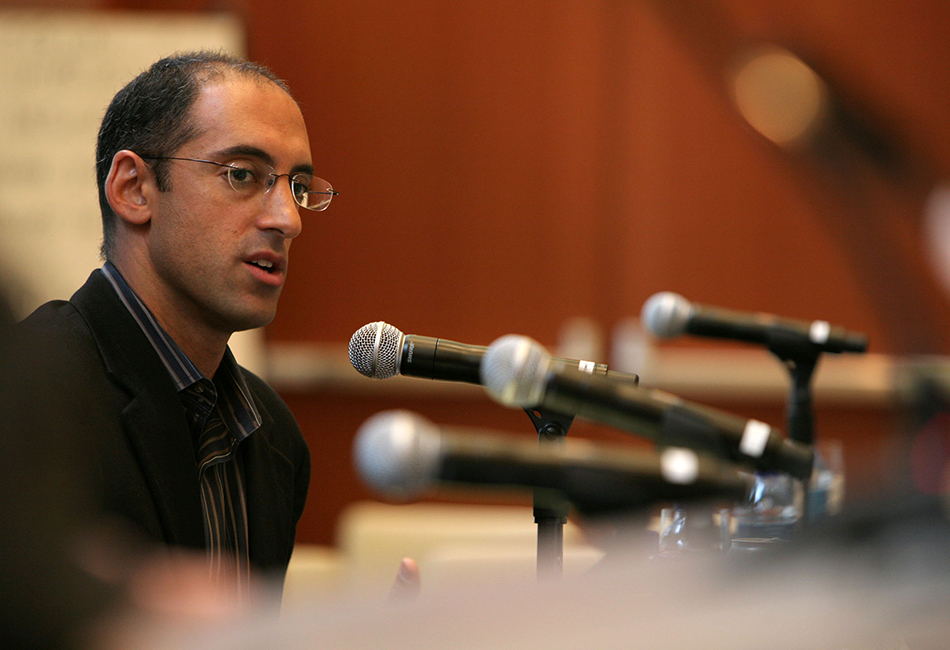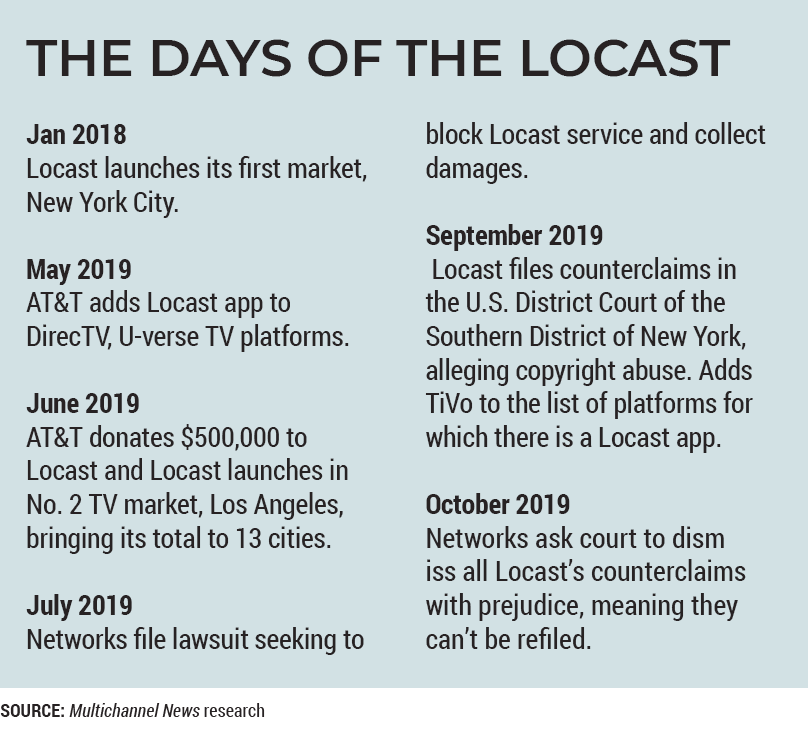Locast, Stations Engage In Multi-Front Legal Fight
The smarter way to stay on top of the multichannel video marketplace. Sign up below.
You are now subscribed
Your newsletter sign-up was successful
The legal fight over the free streaming of TV-station signals over the internet is heating up as the networks and Locast prepare for their latest court battle and as previously quiet broadcasters have been making lots of noise — particularly after pay TV providers started recommending the online Locast platform as an alternative in retransmission disputes.
When Locast, a website that retransmits local broadcast TV signals, first launched in New York in January 2018, station owners were surprisingly reticent. That was not the case in 2012 when Barry Diller launched Aereo, a similar site that claimed simply to be using the web to provide access to subscribers' individual over-the-air antennas housed on its premises. Because of those individual antennas, Aereo argued, it did not have to negotiate carriage deals with TV stations. Broadcasters fought back immediately, won in court, and Aereo’s service went belly up.

Locast, too, did not ask for permission to retransmit New York stations or pay for carriage. As a nonprofit, Locast argued, it was using a copyright-law carveout also used by broadcasters to retransmit their primary signals to hard-to-reach locations.
Broadcasters were initially mum about Locast, possibly because some affiliates were OK with the extra online eyeballs. Networks were starting to strike online deals for their content that did not include local advertising; Locast’s streams included those ads.
But multichannel video programming distributors (MVPDs) began to point their customers toward Locast as a way to view TV stations that had blacked out their traditional services during retransmission disputes, reducing broadcasters’ leverage.
Charter Communications, for example, started talking up Locast during its retrans fight with Tribune Broadcasting stations. DirecTV owner AT&T also invested half a million dollars in the service to help make sure it continued to provide that online option.
According to one source familiar with Locast operations, it is approaching 1 million signups.
The smarter way to stay on top of the multichannel video marketplace. Sign up below.
The Sports Fans Coalition, which launched Locast, has long argued that blackouts and escalating ticket prices and rights fees are consumer unfriendly and require some kind of redress that wasn’t forthcoming from either government or the private sector. That was part of the impetus behind Locast.
The networks were taking plenty of time getting their legal ducks in a row, since there is clearly a copyright carveout for nonprofits. But broadcasters did ultimately sue collectively in July of this year. They said Locast was “nothing like the local booster services contemplated by Congress” when it created the translator exemption.
The legal battle had begun in earnest. The network filing was followed by a Locast counterclaim alleging anti-competitive collusion, saying the broadcasters had gotten together to try and shut down the service or bury it in needless and costly litigation in order to “protect their market dominance in the retransmission-consent market.”
That was followed by the networks’ request that the court reject that claim, followed by a conference between the parties and the court on Nov. 1. Those legal balls remain in the air, with no resolution at press time on the network request to quash the counterclaim. “Just lawyers working on scheduling,” Locast founder David Goodfriend said.
Free, but Donations Sought
While Locast said its service is free, one user who reached out to Multichannel News disputes that. He said that after a grace period, streamers periodically lose the TV station signal they are watching and the service sends them to a home screen, asking for a donation. If they do not donate, they can still watch Locast by reloading the channel, having missed some of the program since it is all live. But the site does not make it clear that will be the case if they don't pony up.

Goodfriend conceded that after the grace period of uninterrupted viewing viewers are periodically asked (every 15 minutes, in fact) to donate, and have to reload the channel. But that doesn't mean it is not free, he said.
“The majority of Locast users are not donors,” Goodfriend said, “so the majority are getting something out of this that they like and enjoy and are not paying for it. If that isn’t free, I don’t know what is.” He pointed out that folks seem to have figured out the interruption issue and continue to tune in.
Even if Locast charged for the service, though, its lawyers are likely to argue that as long as that charge only covers expenses, it still qualifies as a nonprofit under the Copyright Law carveout.
In any event, the days of Locast flying under the radar are definitely over.
Contributing editor John Eggerton has been an editor and/or writer on media regulation, legislation and policy for over four decades, including covering the FCC, FTC, Congress, the major media trade associations, and the federal courts. In addition to Multichannel News and Broadcasting + Cable, his work has appeared in Radio World, TV Technology, TV Fax, This Week in Consumer Electronics, Variety and the Encyclopedia Britannica.

